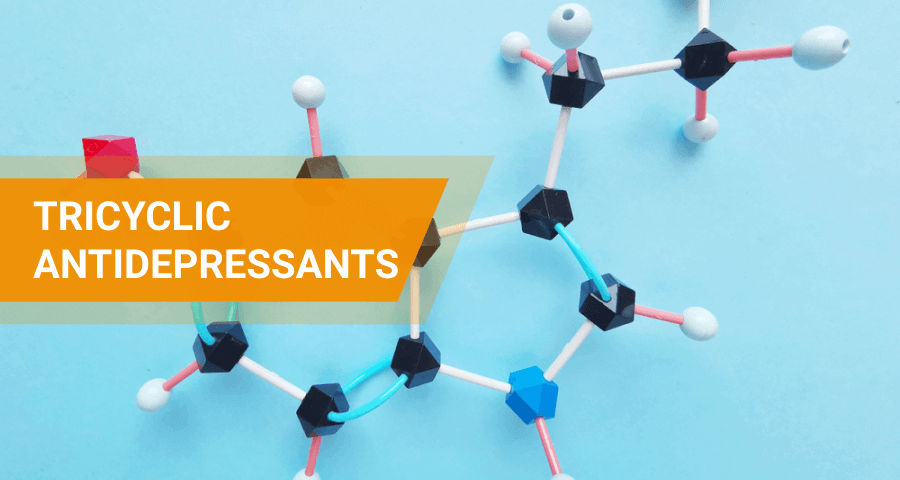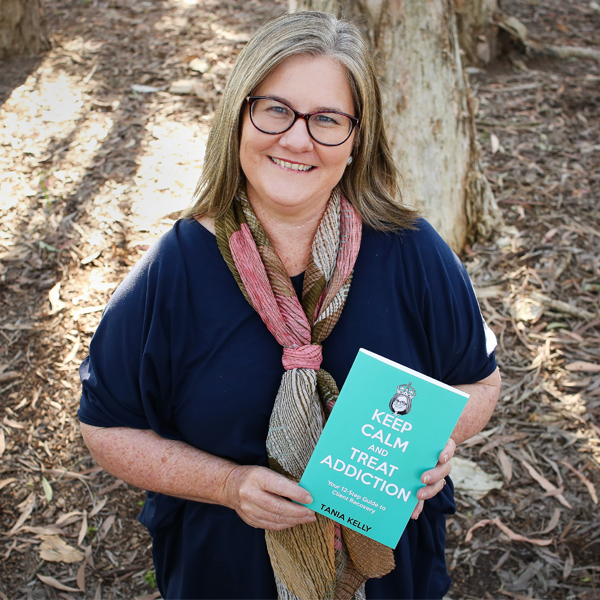
Tricyclic antidepressant drugs are among the four most common antidepressants and they are some of the oldest prescription drugs used for the treatment of depression. In 2019, around 14 million prescriptions of TCAs were issued in the United States, and the most prescribed TCA antidepressant is Amitriptyline, with a prevalence rate of 56.8%. They are not as common as they once were because, in 2017, the number of prescriptions issued was 17 million. This decline is due to TCAs having numerous side effects that newer medications do not.
Table Of Contents:
- What Are Tricyclic Antidepressants?<
- Tricyclic Antidepressants Mechanism of Action
- Uses of Tricyclic Antidepressant Drugs
- Tricyclic Antidepressants Side Effects
- Tricyclic Antidepressants Contraindications
- Tricyclic Antidepressants Interactions
- Tricyclic Antidepressants Overdose
- How to Treat Tricyclic Antidepressants Addiction

In this article, information about tricyclic antidepressants list, their difference with tetracyclic antidepressants, tricyclic antidepressants mechanism of action, uses, side effects, contraindications, drugs and foods that interact with TCAs, TCA overdose symptoms, and how to treat, manage, and prevent tricyclic antidepressants addiction will be provided.
More About Antidepressants:
What Are Tricyclic Antidepressants?
Tricyclic antidepressants, also called cyclic antidepressant drugs and TCAs for short, are amongst the oldest drugs used for depression. They were introduced in the pharmaceutical industry in the early 1950s and have been in use for more than six decades. Furthermore, these antidepressant medications are given their classification based on their chemical structure, which features three rings. When they first hit the market, they were considered revolutionary treatment options.
Compared to the other antidepressant drug classes, namely, selective serotonin reuptake inhibitors (SSRIs medications), serotonin-norepinephrine reuptake inhibitors (SNRIs medications), monoamine oxidase inhibitors (MAOIs medications), and atypical meds, tricyclic antidepressants list of FDA-approved drugs is more extensive than most other depression medication classes.
The FDA-approved Tricyclic Antidepressants List Is:
- Amitriptyline
- Amoxapine
- Clomipramine
- Desipramine
- Doxepin
- Imipramine
- Nortriptyline
- Protriptyline
- Trimipramine
Because their use has fallen out of favor, even the most common drugs from the tricyclic antidepressants list above are not well-known to the general population. In some cases, users who require tricyclic antidepressant drugs may struggle to find a local pharmacy that stocks them.

TCAs vs Tetracyclic Antidepressants
The main difference between TCAs and tetracyclic antidepressants is their chemical structure. The former has three rings while the latter has four. Generally, these two cyclic antidepressant drugs provide the same indication – both are used to treat depression and bipolar disorder. Currently, there is only one FDA-approved tetracyclic antidepressant and that is the drug Maprotiline.
Based on the study of a medical doctor from the United Kingdom, both tricyclic and tetracyclic antidepressants are effective for reducing chronic low back pain. According to the FDA, their side effects are also similar. These include:
- Dry mouth
- Constipation
- Blurred vision
- Drowsiness
- Low blood pressure
So, what makes these two different? Their difference lies in their potency. In a comparative study of neurologists from Sweden, it was found that TCAs are more effective than tetracyclic antidepressant drugs.
Tricyclic Antidepressants Mechanism of Action
What do antidepressants do? The antidepressants’ mechanism of action is elevating the mood of the user. How they do this varies between drug classes, and sometimes between drugs within a depression medication category. With TCAs, the mode of action is not entirely clear. What is known about tricyclic antidepressants mechanism of action is that it impacts the neurotransmitters that ferry communication between brain cells.
Tricyclic antidepressants mechanism of action is blocking the reuptake of serotonin and norepinephrine. This results in their levels being higher in the brain. As these are “feel-good” chemicals, the result is an elevated mood. Take note that when there is a reuptake, the levels of serotonin and norepinephrine in the brain will decline. Like the majority of depression medications on the market, TCAs do not take effect instantly. Although it will only take 30-60 minutes for TCAs to be absorbed, it will take months to fully achieve their effects.
Uses Of Tricyclic Antidepressant Drugs
TCA medications have numerous applications. However, based on a clinical review of medical doctors from Germany, they are not first-line medications for certain conditions because they cause more significant adverse effects. This means that when a doctor encounters conditions in a patient that TCA drugs can treat, they try other medications first. If those prove not to be effective, they may then consider TCAs. By design, TCAs treat depression, including major depressive disorder and mild to moderate depression.
Furthermore, there are other off-label uses when it comes to tricyclic antidepressant drugs. It is very common to use TCAs for anxiety. In general, their use is only considered once the anxiety has reached debilitating levels. Also, as stated above, these drugs can be used to manage pain. However, this is only an option when the pain is chronic and severe.
Types of Pain They Can Treat Include:
- Migraines
- Tension headaches
- Diabetic neuropathy
- Post-herpetic neuralgia
Aside from these, there are also less-common uses of TCAs. For example, the TCA drug Clomipramine can be used to treat the OCD conditions of children 10 years old and above.
Other Less Common Uses of TCAs Include:
- Chronic bedwetting
- Migraine prevention
- Panic disorder
- Bulimia
- Phantom limb sensations
- Chronic itching
- Premenstrual dysphoric disorder
Unlike many other classes, TCAs are not among the antidepressants for weight loss. Also, while they can induce drowsiness, they are not considered ideal antidepressant drugs for sleep disorders. Because of this, patients using these medications are advised not to operate machinery to avoid unwanted dangerous events.
Due to the significant number of side effects TCAs cause and how severe these effects are, they are no longer considered the first line of treatment.
Tricyclic Antidepressants Side Effects
There are numerous side effects of TCAs. Compared to antidepressant adverse effects in other classes, they are among the most severe in their expression as well. Based on a study, tricyclic antidepressants side effects appear because of the dose. Since even a low dose of a TCA drug is potent, overdose is likely to occur. This overdose, then, causes the side effects to appear. Some could even be life-threatening. In this section, the short-term and long-term tricyclic antidepressants side effects will be discussed.
Short-Term TCA Side Effects
Tricyclic antidepressants side effects are dose-dependent. The higher the dose is, the more fatal and irreversible the adverse effect would be. Based on the study of researchers, the most common short-term side effect of TCA drugs is dry mouth, with a prevalence rate of 27%. Others include the following:
- Constipation
- Dizziness
- Blurred vision
- Disorientation
- Confusion
- Urinary retention
- Racing pulse
- Irregular pulse
- Drowsiness
For many users, these common tricyclic antidepressants side effects are already too severe to continue treatment. Patients must discuss these issues with their doctor to determine if stopping use is best. Patients are advised not to stop the use of the TCAs abruptly to avoid antidepressant withdrawal syndrome and other health dangers.
Long-Term TCA Side Effects
Aside from short-term side effects, there are also long-term TCA side effects, and the severity of these adverse reactions increases when the dose increases. So, the effects of TCAs on the weight, sexual function, mental, and cardiovascular health of the patient will be discussed.
Weight changes
As reported by researchers, even at low doses, tricyclic antidepressants abuse can cause significant weight gain. Users’ appetite would usually increase, and this is one reason why some patients and medical doctors do not consider TCAs for long-term therapy.
Sexual function
Based on a study published in the African Journal of Psychiatry, the prevalence rate of sexual dysfunction associated with TCAs is around 30%. These sexual problems include difficulty achieving and maintaining an erection, delayed orgasm, impaired ejaculation, and low sex drive. Sometimes, priapism or painful ejaculation is also observed.
Mental Health
Long-term effects of TCAs can increase the risk of suicidal thoughts, and those below 24 years old are more at risk of this side effect. In a study, 5% of children treated with TCAs develop neurological symptoms such as nervousness, change in personality, and sleep disorder.
Cardiovascular Health
Tricyclic antidepressants abuse induces long-term effects on the heart. In a study published in the Journal of American Geriatrics Society, even at usual dosage, TCAs can cause long-term cardiovascular complications such as sinus tachycardia, ventricular fibrillation, and even sudden cardiac death.

Tricyclic Antidepressant Drugs Contraindications
TCAs are not suitable for all patients. First, these drugs are contraindicated to those who use various medications. This is to avoid dangerous drug interactions.
Aside From This, the Other Contraindications for TCAs Are as Follows:
- Patients with cardiovascular disease
- Patients with seizure
- Those who are hypersensitive to TCA medications
- Patients with angle-closure glaucoma
- Patients with urinary retention
When it comes to pregnancy, taking any medication comes with a risk. As reported, the use of TCAs during pregnancy can cause congenital eye, ear, face, and neck defects. Thus, expecting mothers need to discuss the benefits and risks of antidepressant drugs during pregnancy with their doctors.
Tricyclic Antidepressant Drugs Food and Drug Interactions
Food and drug interactions can also occur when it comes to TCAs. For example, drinking while on antidepressant meds is dangerous as this could cause an increase in blood pressure. Also, those who are under the treatment of TCA medications should not take St. John’s Wort as this can increase the risk of serotonin syndrome.
Furthermore, for the Drug Interactions, Take a Look at the Information Below:
- MAOIs – Taking monoamine oxidase inhibitors such as Phenelzine with a TCA drug can increase the risk of serotonin syndrome.
- Linezolid – This drug is an antibiotic, and when it is taken with a TCA drug, the interaction could lead to serotonin syndrome.
- Phosphate-containing drugs – Drugs with phosphate contents such as Lisinopril should not be mixed with TCA medications. This interaction could cause severe hypotension.
- Tagamet – A Tagamet-TCA drug interaction can exacerbate the side effects of antidepressant drugs.
- Clonidine – When Clonidine is taken with a TCA medication, this can cause dangerously high blood pressure and severe sedation.
Street drugs of all kinds should also be avoided while on TCAs. These include cannabis products regardless of their legality. Even CBD and antidepressant drugs can be problematic. Moreover, to avoid these interactions, patients should tell their medical doctors all the drugs, including natural antidepressant substances and food they take.
25% of those using TCA medications use the drugs recreationally, which in turn, could cause health dangers. Eventually, tricyclic antidepressants abuse could lead to tolerance and dependence that could eventually lead to death.
Tricyclic Antidepressants Overdose
Tricyclic antidepressants overdose is common because of the narrow therapeutic index of the TCA drugs. Compared to other antidepressant drug classes, for example, in tricyclic antidepressants vs SSRI overdose, the former have higher rates of hospitalization, with a prevalence rate of 78.7% while the latter is only 64.7%. Additionally, in terms of tricyclic antidepressants vs SSRI mortality rate, the former has a 0.73% mortality rate while the latter only has 0.14%. Having these statistics, in tricyclic antidepressants vs SSRI, the latter gets the favor.
When it comes to tricyclic antidepressants overdose symptoms, these would usually occur 30-40 minutes after the initial consumption of the drug. Additionally, after 2 hours, these symptoms will start to become visible.
Some of the Overdose Signs and Symptoms Include the Following:
- Dry mouth
- Blurred vision
- Dilated pupils
- Sinus tachycardia
- Pyramidal neurological signs
- Drowsiness
- Convulsions
- Respiratory depression
- Hypotension
- Electrocardiographic (ECG) abnormalities
Take note that cardiotoxicity is the main adverse effect of tricyclic antidepressants overdose. If there is no prompt action regarding this intoxication, this could lead to coma. For these reasons, if any patient under TCA treatment starts to observe any of these side effects, it is highly advised to seek emergency services as soon as possible to avoid other health dangers.
How to Treat Tricyclic Antidepressants Addiction
Although tricyclic antidepressants addiction is rare, tricyclic antidepressants abuse is prevalent. In a study published in The Journal of the American Medical Association, For anyone experiencing tricyclic antidepressants addiction or abuse or just wants to stop their use due to side effects, seeking out the help of a drug rehab center is best. At these centers, professionals know how to taper the drugs properly and make a plan for tricyclic antidepressants addiction treatment, as well as depression. Once antidepressant addiction treatment is complete, it will be easier to live a healthy life. Users looking into getting off antidepressant medications should seek out medical supervision for the process. Rehab centers will be able to create a tapering schedule, relapse prevention plan, and offer drugs that make the process easier. Once the patient is off the medication for at least two weeks, they will be able to look into alternatives, including over-the-counter antidepressant medications. For additional support during this time of the pandemic, considering online Narcotics Anonymous meetings will also be of great help for a more successful tricyclic antidepressants addiction recovery.
Hope Without Commitment
Find the best treatment options. Call our free and confidential helpline
Most private insurances accepted
Find Drug Rehabilitation Centers Near You Anywhere In the US
Addiction Resource team has compiled an extensive list of the top drug rehabilitation facilities around the country. Use our locator tool to find the best centers near you.
Page Sources
- Bérard, A., Zhao, J. P., & Sheehy, O. (2017). Antidepressant use during pregnancy and the risk of major congenital malformations in a cohort of depressed pregnant women: an updated analysis of the Quebec Pregnancy Cohort. BMJ open, 7(1), e013372.
- Berken, G. H., Weinstein, D. O., & Stern, W. C. (1984). Weight gain: a side-effect of tricyclic antidepressants. Journal of Affective Disorders, 7(2), 133-138.
- Calvi, A., Fischetti, I., Verzicco, I., Murri, M. B., Zanetidou, S., Volpi, R., ... & Cabassi, A. (2021). Antidepressant Drugs Effects on Blood Pressure. Frontiers in Cardiovascular Medicine, 8.
- Crome, P. (1986). Poisoning due to tricyclic antidepressant overdosage. Medical toxicology, 1(4), 261-285.
- Hillhouse, T. M., & Porter, J. H. (2015). A brief history of the development of antidepressant drugs: from monoamines to glutamate. Experimental and clinical psychopharmacology, 23(1), 1.
- Jackson, J. L., Shimeall, W., Sessums, L., DeZee, K. J., Becher, D., Diemer, M., ... & O’Malley, P. G. (2010). Tricyclic antidepressants and headaches: systematic review and meta-analysis. Bmj, 341.
- Jespersen, S. (2006). Antidepressant induced sexual dysfunction, part 1: epidemiology and clinical presentation. African Journal of Psychiatry, 9(1), 24-27.
- Kane, S. P. P. (2019c). Tricyclic Antidepressants - Drug Usage Statistics, ClinCalc DrugStats Database. ClinCalc. https://clincalc.com/DrugStats/TC/TricyclicAntidepressants
- Khalid, M. M., & Waseem, M. (2017). Tricyclic Antidepressant Toxicity.
- McKenzie, M. S., & McFarland, B. H. (2007). Trends in antidepressant overdoses. Pharmacoepidemiology and drug safety, 16(5), 513-523.
- Paykel, E. S., Freeling, P., & Hollyman, J. A. (1988). Are tricyclic antidepressants useful for mild depression? A placebo controlled trial. Pharmacopsychiatry, 21(01), 15-18.
- Trindade, E., Menon, D., Topfer, L. A., & Coloma, C. (1998). Adverse effects associated with selective serotonin reuptake inhibitors and tricyclic antidepressants: a meta-analysis. Cmaj, 159(10), 1245-1252.
- Staiger, T. O., Gaster, B., Sullivan, M. D., Deyo, R. A., & Underwood, M. (2004). Tricyclic and tetracyclic antidepressants are moderately effective for reducing chronic low-back pain/COMMENTARY. ACP Journal Club, 141(1), 13.
- Von Wolff, A., Hölzel, L. P., Westphal, A., Härter, M., & Kriston, L. (2013). Selective serotonin reuptake inhibitors and tricyclic antidepressants in the acute treatment of chronic depression and dysthymia: a systematic review and meta-analysis. Journal of affective disorders, 144(1-2), 7-15.
- Xu, X. M., Liu, Y., Dong, M. X., Zou, D. Z., & Wei, Y. D. (2017). Tricyclic antidepressants for preventing migraine in adults. Medicine, 96(22).


 Reviewed by:
Reviewed by:  Written by:
Written by: 

 FindTreatment.gov
FindTreatment.gov